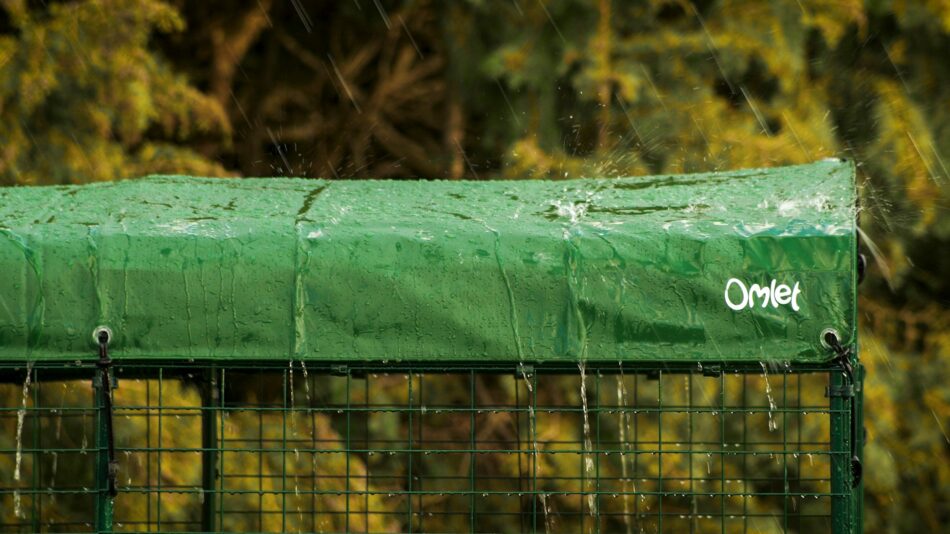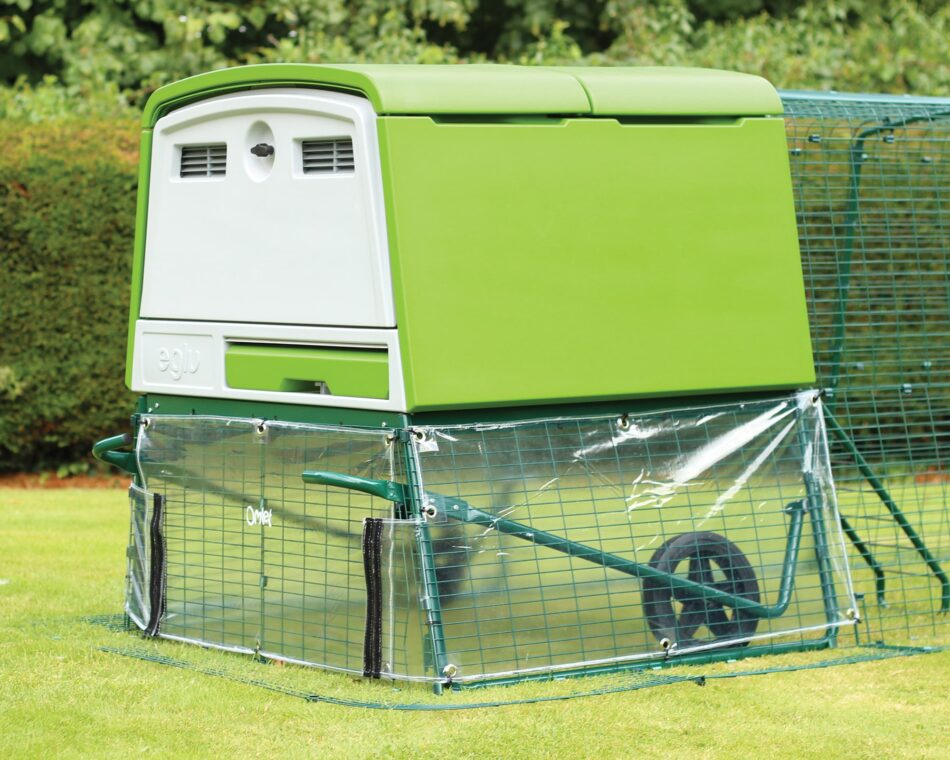Preparing chickens for hurricane season
June 1st marks the beginning of hurricane season in the US. If you live along the coast, you’re probably familiar with these hurricane preparation steps: putting fresh batteries in flashlights, stocking up on non-perishable food items, making sure your car’s gas tank is full, filling water jugs and bottles, and maybe even investing in a generator. But are you preparing your chickens for hurricane season?
It’s important to have a plan if and when a hurricane strikes. This includes planning for your family, indoor pets, and outdoor pets. Thankfully, there are easy steps that you can take to make sure your chicken weather hurricane season along with you.
Table of Contents
4 Hazards of hurricanes to chickens
Hurricanes bring a whole host of severe weather conditions – many of which can be very hazardous to your hens. Electrical outages, water shortages, and decreased mobility all add to the difficult situations that come along with hurricanes. Get ahead of the storm and prepare your chickens for hunkering down during a hurricane.
1. Supply shortages and hazardous driving conditions
Stock up on your flock’s feed well before the storm is anticipated to make landfall. Suppliers may not be able to make deliveries to stores as the storm grows stronger, so keeping an extra bag or two of feed at the beginning of hurricane season is a wise investment. You may also want to keep reserves of bedding in your supplies so that you don’t have to brave the roads in search of shavings or straw. Keep empty drink containers to refill with drinking water for your hens, or purchase containers to store water in.
2. High winds
Wind gusts of over 75 mph are common during hurricanes and tropical storms, and in the case of category 3 hurricanes and higher, can reach speeds of over 100 mph. If a hurricane does not warrant evacuation, your hens should be firmly secured inside of a strong chicken coop. Tethering your hens’ house to the ground through the use of ground rods such as t-posts and tie-down straps will help prevent movement during high winds.
3. Heavy rainfall and flooding
Make sure your chickens have an elevated chicken coop to escape to during heavy rainfall. It’s common for hurricanes to cause flooding – sometimes in the form of flash floods. Giving your hens plenty of chicken perches inside of their run will give them a safe place to escape from rapidly rising water. Adding weather protection to your chickens’ run will help abate the accumulation of rainfall.
4. Tornadoes
Similar to high winds, tornadoes can topple chicken coops or even toss them around your yard. Tornadoes are common events during a hurricane or tropical storm and can form quickly. In addition to making sure your chicken coop is tethered to the ground to prevent it from being overturned, keep your chickens’ coop away from trees or powerlines that could potentially fall. Mobile chicken coops are particularly helpful for sudden weather events, as they can be moved to safety quickly on short notice.
Weatherproofing your chicken coop for a hurricane
Hurricanes typically come with advance warning, but you’ll need a plan to put into action once a hurricane warning has been issued. Many of these modifications can even be made at the start of hurricane season to avoid having to frantically prepare your flock when the weather turns wild.
Temporary chicken housing
If you have an old wooden chicken coop vs a sturdy plastic coop, relocating your chicken flock to a safer space may sometimes be the best option in preparation for a hurricane or tropical storm. A garage, shop, or sturdy shed can house hens that are displaced due to weather conditions. Be sure all hazardous materials are out of your flock’s reach, like:
- Electrical cords or wiring
- Pesticides, weed killer, antifreeze, motor oil, or other liquids
- Exposed lawn mower blades or other sharp lawn care instruments
Or, in an emergency, you may need to temporarily house your chickens in your home. An enclosed space that’s easy to clean like tiled rooms or areas are ideal temporary housing for chickens. A playpen designed for small animals can keep your hens contained to a desired area of your home.
Chicken tractors for easy relocation
Our chicken tractors are mobile chicken coops that are designed to be moved quickly and easily. For chicken keepers living in regions that frequently experience severe weather, mobile chicken coops offer the best flexibility for your flock. Simply engage the wheels on each side, then roll your hens’ entire home to safety. This could be in a garage or shed or another sturdy structure, to higher ground in the case of flooding, or simply out of the trajectory of trees or power lines that could potentially fall during a hurricane.
Fortifying stationary coops
The best option for flocks that will be staying put during a storm is the Eglu Cube Chicken Coop. Heavy-duty and waterproof, our largest chicken coop can keep your hens safe during perilous times. These strong chicken coops have withstood hurricanes, tornadoes, falling trees, and other wild weather events.
Fortify your flock’s Eglu Cube with an Automatic Chicken Coop Door by Omlet. The horizontal opening and closing mechanism operates on a spiral gear system, which makes it incredibly difficult to pry or force open. The audible seal, once the Autodoor has closed, lets you know that your hens are safe inside their reinforced coop.
If your coop and run will be staying put, add screw pegs along the bottom of the run to help hold it down during high winds. For excessive wind speeds, use tie-down straps to anchor your Eglu Cube to the ground. T-posts, fences set in concrete, or buildings with foundations make good anchor points for straps.
Evacuation planning
Sometimes it’s safer to evacuate in preparation for a strong hurricane. Evacuations can be voluntary or mandatory, but whatever the case may be, you’ll need to have a plan for your flock. A mobile chicken coop can be easily rolled onto a small trailer or truck to be relocated. Or, you can quickly disassemble your Omlet chicken coop to take with you. Your Eglu coop can then be easily reassembled once you reach your destination. Chicken fencing is also quick and easy to take down and reassemble to give your flock some space once you arrive.
Hens can be transported in dog kennels, but take care when using wire kennels, as your chickens’ legs may get caught. The best kennels to use are those with plastic floors and sides. Rabbit cages are also suitable for transporting hens.
5 hurricane essentials to bring with you:
- Feed and feeders
- Water and waterers
- Housing (either their regular coop, or temporary accommodations)
- Additional bedding for their coop
- Chicken supplements to help combat the stress of relocating
After the hurricane
After the storm has passed, it will be time to assess the damage. First, check in with your chickens if they weathered the storm in their coop to make sure none of them sustained injuries. Contact your veterinarian right away if you suspect any illness or injury resulting from the stress of the storm.
Carefully remove debris from your yard or anywhere that your chickens have access to. Broken glass or garden decor, metal, screws, nails, or any other sharp objects should be removed before letting your chickens back out. Check to make sure your chicken run is still securely anchored into the ground, and that all of the clips are still intact.
Offer your flock food and water as soon as they are let out of their coop. The sooner they can get back into their regular routine, the sooner they will unwind from recent events. A stressed-out chicken may not want to eat right after being let out of the coop, but check in with your hens to make sure they are back to eating and drinking within the next several hours. You may also notice a decrease in egg production in the days following a stressful event like a severe storm, which is completely normal.
Be extra vigilant after a severe storm, as wildlife can be displaced during the chaos. Chicken predators like foxes, coyotes, raccoons or stray dogs and cats may find themselves closer to your flock than before as a result of fleeing rising waters or high winds, and will be in search of an easy meal. Rodents will also be on the lookout for seeds and feed they can swipe, so pick up any leftover food from your flock for several days following a storm.
Omlet and chicken care
Omlet makes preparing your chickens for hurricane season less stressful. Give yourself peace of mind when you get your hens a strong, capable coop to help them weather the storms. Whether you ride out the storm at home, or evacuate to temporary accommodations, our expertly designed Eglu Cube and Autodoor will have your hens hunkering down safely during hurricanes.
This entry was posted in Chickens

